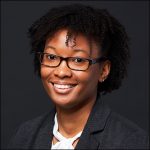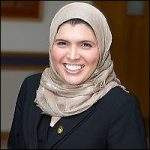The Vanderbilt University School of Engineering has appointed nine new faculty members for the 2022-2023 academic year, with research and teaching activities ranging from artificial intelligence and cyber security to medical devices and clean energy.
Six of the new professors are computer science faculty who were recruited as part of Destination Vanderbilt, a $100 million university initiative to recruit additional faculty in key disciplines. These faculty members include Professor Dan Lin, Associate Professor Pamela Wisniewski, and assistant professors Thomas Beckers, Daniel Moyer, Bryan Ward and James Weimer. Professor De-en Jiang joins the Department of Chemical and Molecular Engineering. Andrea Locke is an assistant professor in biomedical engineering. Mona Ebrish joins the Department of Electrical and Computer Engineering.
“We are pleased to welcome these talented and vibrant scholars to Vanderbilt’s School of Engineering,” said Philippe Fauchet, Bruce and Bridgitt Evans Dean of Engineering. “Their contributions will further strengthen our community of exceptional students and faculty.”
Cynthia Reinhart-King, senior associate dean for research and Cornelius Vanderbilt Professor of Engineering, added that these new faculty members are joining Vanderbilt from some of the world’s top research universities. “They will continue to engage in some of the most critical engineering research and cross-disciplinary work being conducted in their respective fields. I look forward to seeing their scholarship advance even further.”

Professor of Computer Science Dan Lin joins the school from the University of Missouri where she was the Robert H. Buescher Faculty Fellow and associate professor with appointments in the Department of Electrical Engineering and Computer Science and the Department of Management. Lin’s research interests include data analysis and privacy protection in different domains such as cloud computing, mobile applications, social media platforms, and Internet of vehicles. Her research has been supported by the National Science Foundation, National Security Agency, and the Department of Energy. She currently serves as an associate editor for two top security journals: IEEE Transactions on Dependable and Secure Computing and Association for Computing Machinery’s Transactions on Privacy and Security. Lin received a Ph.D. from the National University of Singapore, and she was a post-doctoral scholar at Purdue University.

Associate Professor Pamela Wisniewski is an expert in the interplay between social media, privacy, and online safety for adolescents. She was an associate professor of computer science and director of the Sociotechnical Interaction Research (STIR) Laboratory at the University of Central Florida. Wisniewski has authored more than 100 peer-reviewed publications and won multiple best papers awards. She is an ACM Senior Member and the first and only computer scientist to be selected as a William T. Grant Scholar for her work on reducing digital inequality of underprivileged youth. Her research has been featured by popular news media outlets, including ABC News, NPR, Psychology Today, and U.S. News and World Report. She earned a Ph.D. in computing and information systems from the University of North Carolina at Charlotte and bachelor and master’s degrees in decision and information sciences from the University of Florida.

Thomas Beckers is postdoctoral researcher in the Department of Electrical and Systems Engineering at the University of Pennsylvania. He will join the faculty as an assistant professor of computer science Jan. 1, 2023. His research interests include physics-enhanced learning, nonparametric models, and safe learning-based control. Beckers works to bridge the gap between machine learning and control theory to develop new algorithms toward safe, robust, and intelligent control of physical systems. For this work, he focuses on Bayesian model as a learning method. He earned a Ph.D. in electrical engineering in 2020 from the Technical University of Munich. He received B.Sc. and M.Sc. degrees in electrical engineering in 2010 and 2013, respectively, from the Technical University of Braunschweig, Germany. In 2018, he was a visiting researcher at the University of California, Berkeley.

Assistant Professor Daniel Moyer’s research focuses on machine learning applied to medical imaging. He currently works on tracking and reconstruction projects in fetal MRI, multi-site problems or ‘harmonizaton’ in medical image analysis, and segmentation problems in intra-vascular ultrasound. Moyer has published work on neuroimaging and diffusion weighted MRI models, for which he received the Medical Image Computing and Computer Assisted Interventions Society’s Young Scientist Award in 2016. Moyer joins the School of Engineering from the Computer Science & Artificial Intelligence Laboratory at MIT where he was a postdoctoral scholar. Moyer has a bachelor’s degree in mathematics of computation and a minor in statistics from UCLA where he also earned Latin Honors. He received his Ph.D. in computer science from the University of Southern California in 2019.

Assistant Professor Bryan Ward joins the engineering faculty from the Lincoln Laboratory at MIT where he was a technical staff member in the Secure Resilient Systems and Technology Group. His research focuses on the security and resilience of real-time and embedded systems in application areas critical to national security, such as industrial control systems and space systems. Ward is the first-prize winner of the 2020 AFCEA Cyber Edge Writing Challenge for his article coauthored with Ryan Burrow titled “Control Systems Need Software Security Too,” which appeared in Signal Magazine. Prior to joining the Lincoln Laboratory in 2016, Ward earned both an M.S. and Ph.D. degrees in the Department of Computer Science at the University of North Carolina at Chapel Hill. Ward holds a B.S. in computer science and engineering and a B.A. in mathematics from Bucknell University.

Assistant Professor James Weimer develops foundations and tools for safety and predictable performance of learning-enabled cyber-physical systems, primarily targeting the internet-of-medical-things (IoMT). Weimer addresses real-world medical problems with an interest in technology transfer and commercialization. He is a co-founder of wearable technology companies Neuralert Technologies and Vasowatch. Weimer is the author of several journal articles and conference papers, and he has won three best paper awards. He joins the school from the University of Pennsylvania where he was a research assistant professor in the Department of Engineering and Applied Sciences. Weimer earned a bachelor’s degree in electrical engineering from Purdue University and master’s and Ph.D. degrees in electrical and computer engineering from Carnegie Mellon University.

Professor of Chemical and Biomolecular Engineering De-en Jiang joins the faculty from the University of California, Riverside, where he was a professor of chemistry. Jiang’s research focuses on applying state-of-the-art computational methods to important chemical systems and energy-relevant problems. He has authored and co-authored more than 270 peer-reviewed publications in such journals as Science, Nature Materials, Nature Communications, Journal of the American Chemical Society, Nano Letters, ACS Nano, Accounts of Chemical Research, and Angewandte Chemie, a journal of the German Chemical Society, that together have been cited more than 15,000 times. In 2009, he won the US Department of Energy Early Career Award; in 2010, he won the Presidential Early Career Awards for Scientists and Engineers (PECASE), the highest honor bestowed by the United States government on outstanding scientists and engineers in the early stages of their independent research careers. In 2012, he was named a Kavli Fellow by the National Academy of Sciences. Jiang received his B.S. and M.S. degrees from Peking University and his Ph.D. degree from UCLA, all in chemistry.

Andrea Locke, assistant professor of biomedical engineering and chemistry, focuses on developing novel optical biosensing platforms to address current clinical diagnostic challenges at the point of care. Locke’s joint appointment in in chemistry and biomedical engineering allows her to merge bioassay design and optical engineering to design novel devices in this area. One of Locke’s projects developing an at-home monitoring tool for early detection bacterial infection. Locke earned a B.S. in 2010 and a Ph.D. in 2016 in biomedical engineering at Texas A&M. She was a postdoctoral researcher in the Center for Remote Health Technologies and Systems at Texas A&M, 2016-2018, and an Academic Pathways Postdoctoral Fellow at Vanderbilt, 2018-2021.

Mona Ebrish will join the Vanderbilt engineering faculty Jan. 1, 2023, as an assistant professor of electrical and computer engineering. She is a postdoctoral fellow at the U.S. Naval Research Lab in Washington, D.C., investigating wide-bandgap semiconductors for high-voltage applications. Her research has resulted in more than a dozen patents and over 30 papers and abstracts in major journals and conferences. Ebrish is a Fulbright Scholar who received a B.S. degree in electrical engineering from the University of Tripoli, Libya, and a M.S. and Ph.D. in electrical engineering from the University of Minnesota, in 2011, 2015 respectively. She joined IBM as an Advisory Research Scientist where she spent four years working on CMOS technologies and non-volatile memory.
Contact: Brenda Ellis, 615 343-6314
brenda.ellis@vanderbilt.edu